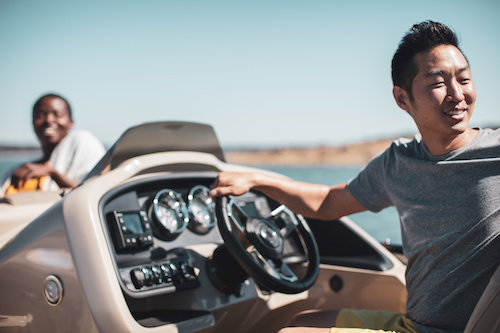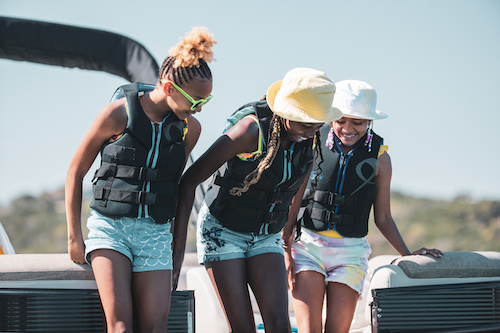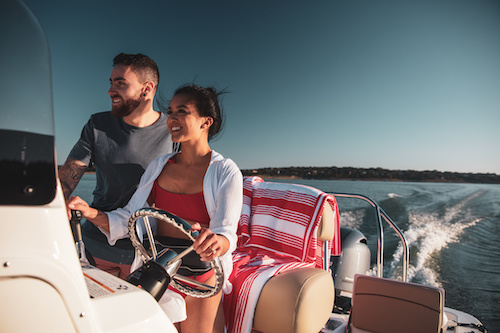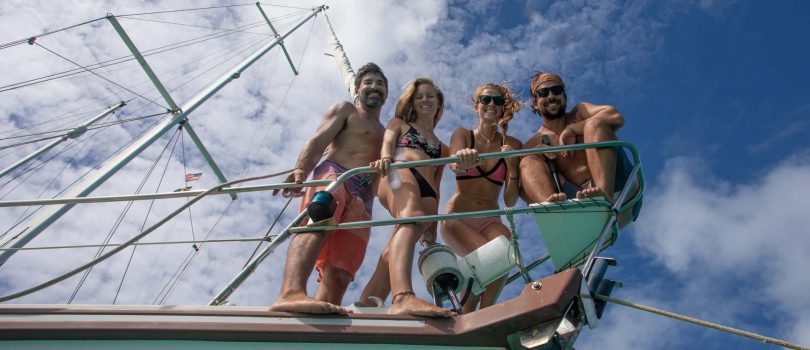If you just bought a new boat or you’re thinking about buying one for the first time, or if you're renting a boat for the day or tagging along on a friend's boat, we have some good news for you: on top of being flat-out fun, research has proven that boating is good for your health and mind. But like any new experience, someone who’s not an experienced boater may have a bit of anxiety over casting off the lines for the first time. Never fear, dear new-to-boating boater—we’re here to help.
Here's some tips that will help ensure your first-time out on a boat is a fun, safe, and rewarding experience.
1. Keep It Safe
You knew that was coming, didn’t you? Boating is actually an incredibly low-risk activity, but like anything, the fun stops abruptly if someone gets hurt. Pay attention as you take your boating safety course, and spend some time perusing our Boating Safety Guide before you shove off the dock.
2. Decide What Activities You Want to Try
With the safety stuff out of the way, prepare yourself to have some serious fun. We mean actually prepare yourself—check out 10 Fun Things to Do on a Boat, and think about which sorts of activities are likely to be embraced by entire family. You might even want to call a family meeting and gather around the kitchen table to discuss all the options.
When you’ve decided on a plan of action, make a list of any boating accessories you may need to be fully prepared for all the grin-generating wave-hops, laughter-inducing tube-towing, and/or smile-causing fish-catching that’s about to come.
Read more: silverton boats for sale
3. Check the Weather
Pick your weather carefully. Although we’d all like to go boating each and every time the schedule allows, it is an activity that Mother Nature has a big impact on. If a stiff breeze or thunderstorms are in the forecast, it’s best to keep your powder dry and wait for a better window of opportunity.
See Weather Safety Tips for Boaters, to gain some insight into what does and does not make for good boating conditions.
4. Remember to "Walk Before Your Run"
Ease into the boating lifestyle with short trips that don’t take you too far afield. You don’t need to start off with a long-distance cruise or an overnight camping adventure right off the bat. Most people will be best off if they build up to bigger trips by starting with smaller, shorter ones that help build confidence.
You’ll quickly figure out what sorts of provisions and gear are best to keep on hand, how to respond to different situations that may arise out on the water, and how long the crew enjoys different activities before a change of pace is due. As any parent can probably guess, this is particularly important if you have kids.
5. Life Jackets for Everyone!
Pick out life jackets that are comfortable, not because they’re the cheapest option available. Again, this is particularly important if you have kids. Ill-fitting or poorly designed life jackets will grow less and less comfortable as the day wears on, and there are so many types and choices these days that it’s quite easy to find a comfy life jacket for anyone of any size or age. You’re wondering how you’ll figure out which is best?
6. Plan Ahead: Use a Pre-Departure Checklist
Plan in some extra time both before and after the trip. When you’re trying something new you don’t want to be rushed, and there will be some set-up time needed to stow the gear, prep the boat for launch, and go through your pre-departure checklist. When you return to the dock, you’ll want to allow extra time for securing the boat, cleaning it up, and washing it down. Keep this in mind as you decide when to start your trip and when you end it, so you don’t end up under any pressure to hurry.
Take Me Fishing also has another great resource to explore, "Use this Checklist Before & After Every Outing."
7. Slow Down for Waves
This may sound a bit simplistic, but the truth of the matter is that after hopping over a few small waves, most new boaters leave the throttle open for larger and larger ones—right up until they hit the one so big that it hurts. Remember that wave impacts are often worse for the passengers than they are for the captain, who is more likely to see the wave coming and be prepared for the impact. So if you’re running the boat and you feel a thump, other people aboard may have felt a slam or a bang.
The solution is quite simple: pull back on the throttle, before the boat hits big waves. Check out our How to Drive a Boat guide, for more info on what to look out for when you’re at the wheel.
8. Learn How to Adjust the Trim
When you get your boat up and running, play with the trim a bit to find the boat’s “sweet spot.” Many inexperienced boaters forget all about trimming, because the boat seems to be running just fine. And it may well be running just fine. Play with the trim, however, and you’ll almost always discover that it could be running even better. Trimming will change how the hull meets the waves, can affect speed and maneuverability, and can make the ride a lot more (or less) comfortable.
Every boat responds a bit differently to trim, so the only way to find that sweet spot is to try changing trim in small increments and seeing how your boat reacts. Read How to Trim a Boat if you’re not entirely sure just how trimming works.
9. Get the Whole Crew Involved
Give kids and crew members jobs. One of the best things about boating, particularly as a family, is that it naturally engenders teamwork. But this only happens when the captain gives everyone aboard the opportunity to lend a hand. Even the youngest crew members can participate if you give them a simple task like helping you watch for flotsam as you cruise. There are plenty of ways to get everyone involved; see A Crew of Kids: Family Team Work for more ideas on what sorts of responsibilities you can assign out.
10. Have Fun—and Don't Forget to Wave!
Have fun, and don’t forget to wave as you pass your fellow lovers of boats. Whether you know it or not, you’ve just joined a new family—the family of boaters. We all share one thing in common, and that’s our passion for boats and boating. So when we see another boat out on the water—any boat —we wave to each other. It’s part of boating etiquette, part of the lifestyle, and part of why we all have such a great time out on the water. Get ready to enjoy it, for yourself!







